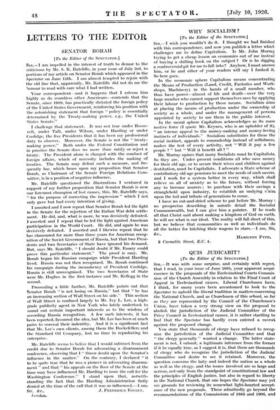LETTERS TO THE EDITOR SENATOR BORAH
[To the Editor of the SPECTATOR.]
Sia,—I am impelled in the interest of truth to demur to the criticisms by Mr. S. K. Ratcliffe, in your issue of July 3rd, to portions of my article on Senator Borah which appeared in the Spectator on June 12th. I am almost tempted to rejoin with the old line that, apparently, Mr. Ratcliffe did not do me the honour to read with care what I had written.
Your correspondent—and it happens that I esteem him highly as do countless other Americans—contends that the
Senate, since 1919, has practically dictated the foreign policy of the United States Government, reinforcing his position with the astonishing statement that foreign "policy is essentially determined by the Treaty-making power, e.g., the United States Senate."
I challenge that statement. It was not true under Roose- velt, under Taft, under Wilson, under Harding or under Coolidge, the five Presidents that it has been my professional duty to observe. Moreover, the Senate is not the "treaty- making power." Both under the Federal Constitution and in practice the Senate does no more than ratify or reject a treaty. The President alone is charged with the conduct of foreign affairs, which of necessity includes the making of treaties. The Senate may defeat such a• measure, and fre- quently has, which bears upon my proposition that Senator Borah, as Chairman of the Senate Foreign Relations Com- mittee, is in a position of negative influence.
Mr. Ratcliffe questioned the illustrations I ventured in support of my further proposition that Senator Borah is now our foremost champion of lost causes, this, Mr. Ratcliffe says, "for the purpose of correcting the impression" which I not only gave but had every intention of giving.
I asserted and I now repeat that Senator Borah led the fight In the Senate for the rejection of the Italian War debt settle- ment. He did, and, what is more, he was decisively defeated. I asserted and I repeat that he led the fight against American participation in the World Court. He did, and again he was decisively defeated. I asserted and I likewise repeat that he has clamoured for more than three years for American recog- nition of the Soviet Government of Russia, but that two Presi- dents and two Secretaries of State have ignored his demand. -But, says Mr. Ratcliffe, "I should doubt if Mr. Essary could prove this particular statement." The proof is easy. Mr. Borah began his Russian campaign while President Harding lived. Russia was not then recognized. Mr. Borah continued his campaign during the incumbency of President Coolidge. Russia is still unrecognized. The two Secretaries of State were Mr. Hughes in the first instance and Mr. Kellogg in the second.
Proceeding a little further, Mr. Ratcliffe points out that Senator Borah "is not losing on Russia," but that "he has an increasing section of Wall Street on his side." This section of Wall Street is confined largely to Mr. Ivy L. Lee, a high- grade publicity agent in New York who lately undertook to sound out certain important interests as to the wisdom of according Russia recognition. A few such interests, it has been reported, favoured the idea, but Mr. Lee has been at much pains to conceal their indentity. And it is a significant fact that Mr. Lee's own clients, among them the Rockefellers and the Standard Oil Company, lost no time in repudiating his enterprise.
Mr. Ratcliffe seems to belive that I would subtract from the credit due to Senator Borah for advocating a disarmament conference, observing that I" throw doubt upon the Senator's influence in the matter." On the contrary, I declared "it to be quite true that he was a pioneer in advocating disarma- ment" and that "his appeals on the floor of the Senate at the Lime may have influenced Mr. Harding to issue the call for the Washington Conference." I stand upon that, notwith- standing the fact that the Harding Administration flatly denied at the time of the call that it was so influenced.—! arm










































 Previous page
Previous page